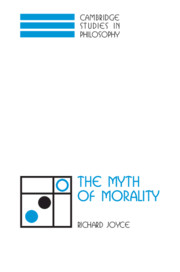6 - Morality and evolution
Published online by Cambridge University Press: 22 September 2009
Summary
THE EVOLUTION OF MORALITY: HELPING KIN
A proponent of an error theory – especially when the error is being attributed to a common, familiar way of talking – owes us an account of why we have been led to commit such a fundamental, systematic mistake. In the case of morality, I believe, the answer is simple: natural selection. We have evolved to categorize aspects of the world using moral concepts. Natural selection has provided us with a tendency to invest the world with values that it does not contain, demands which it does not make.
This is an empirical hypothesis and should be tested as such. In the context of the present work, however, it must be left with the status of “plausible speculation” backed up with some references to other studies. I do not pretend to argue here the case in detail, but am content to outline the content of the hypothesis.
Most parties agree that the origins of morality lie in the development of human cooperation. Few will object to the view that the human tendency to help each other in certain circumstances is a trait that has been naturally selected for. In the past few decades we have gained a clear picture of how helping traits can be favored by forces of natural selection – something which, perhaps, seems initially puzzling. The first step is helping behavior among family members.
- Type
- Chapter
- Information
- The Myth of Morality , pp. 135 - 174Publisher: Cambridge University PressPrint publication year: 2001
- 1
- Cited by



